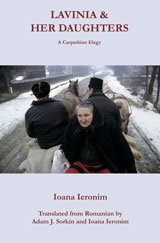Poems
Excerpts from the volumes
Lavinia and Her Daughters

by Ioana Ieronim
Translated from Romanian by Adam J. Sorkin and Ioana Ieronim. With the translator's preface.
Červená Barva Press, 2020.
Cover photo: Kathleen Laraia McLaughlin
Photo taken in Romania from the album "The Color of Hay."
This is the story of a widow who travels with her two young daughters from her port city on the Black Sea to the village of her husband’s kin: a small rural community in the Romanian Carpathians. There, she succeeds to raise her daughters through strength of character and hard work as the village seamstress. Thus the protagonist serves as a shrewdly perceptive witness who knows everybody and muted voice through which we hear the villagers of this mountain locale with its pastoral heritage. The events take place at a margin of space on the still remembered border between the former Austrian and the Ottoman empires and a thin, transitional margin of time: the Soviet takeover following World War II. The new order would ultimately destroy the timeless lifestyle that had survived in the Carpathians well into the twentieth century and beyond.
“An amazing object of virtuosity.” -- Al.Călinescu
“A beautiful thrilling book.” – Tania Radu
“This is a ‘total,’ polyphonic poem, containing magic realism associated with epic-type intertext, feature reportage with memoir, hyperrealism and lyrical incantation, portraits and dialogue-based sequences.” – Paul Cernat
“It contains a perspective of metaphysical nature, wherein people and happenings are considered in relation to the eternal flow of life in the universe.” – Nicolae Manolescu
When Big Is Not Beautiful: The House of the People
Translated by Adam J. Sorkin (verse) and Ernest H. Latham, Jr. (collage) with the author
Dragon Kites over the Mountains

“Dragon Kites…” displays a profound and also profoundly beautiful understanding of people and place, of tradition and disinheritance. An embracing humanity is Ieronim’s muse… The richness of each poem, as well as the deeply symbolic understanding of the Catalan world they display, is extraordinary. -- Fiona Sampson
Omnivorous Syllables
Omnivorous Syllables displays an expansiveness reaching "from Paradise to Inferno": Manhattan skyscrapers feed on neutrinos; emotions swing between "deepest historical fear" and "highest historical ecstasy". -- Robert Murrey Davis
Ioana Ieronim writes with the perfectionism of a mind always in flight. The poet is both protagonist and witness, present and yet constantly escaping the self in order to record the sensibilities of other places, other people. To read a new Ieronim collection is always to embark on a mystery tour full of intense textual pleasure and sensation. – Fiona Sampson
Ariadne's Veil
Very impressive work. These poems may be light in tone and movement but they are absolutely serious in essence, and in many cases philosophical... And it is not only the big poems that impress. I can also completely identify with a brilliantly wise little poem like Blackberry: “that big blackberry / there/ is the word I need / in my line // I’ve tried to get it // nettles and thorns / hurt my hand // that ripe blackberry / gleaming / in the thicket. -- Dennis O’Driscoll
The Lens of a Flame
Ioana Ieronim keeps a distance from all the variety of literary trends that have ever emerged, though she knows them well, down to our literary age when people have even stopped trying to give a name to emerging literary modes. This is a poetry of dazzling simplicity, which is at once love song, metaphysics of love and philosophy of utterance from the moment when it rises in the mind, to the whirlwind of a poem. – Lidia Vianu
Tempo Rubato

There is a state that is both intensely in and intensely out of the world. It is poignant, human, yet yearns for another state altogether.
The poems begin with words, pass through nature and apprehensions of states beyond both nature and words, and end with bodies in a group of beautiful love songs that could have been written at any time in history, that float into language as naturally as the sharp air that billows around them, as naturally as the Song of Solomon. – George Szirtes
Fool's Triumph
Translated by Georgiana Farnoaga and Sharon King
The Triumph of the Water Witch

“The Triumph of the Water Witch” is a major work. -- Robert Murrey Davis
Born at a time when “the century was breaking in half”, Ieronim narrates, mostly from a child’s perspective, the unsettling tale of Communism’s rise in her native Romania. She effectively conveys youthful fear and confusion in the midst of political upheaval through poignant vignettes filled with cinematic detail: all the sights, sounds and smells of the child’s limited world here subtly and powerfully evoke the bigger picture of vast societal change. -- KIRKUS REVIEWS
All the texts are a search for the possibility to keep one’s interior freedom and truthfulness while the world around is falling apart. -- Ute Rill
Ioana Ieronim’s “Triumph of the Water Witch” is an extraordinary book. A verse novel which is also the autobiography of a community “at a time when the century was breaking in half. It is a narrative device which allows the epiphanic, the sensual, the incomprehensible and the fabular to co-exist. -- Fiona Sampson
The author felt compelled to write the book out of a deep, inward moral need to bear witness to the degradation of human individuality and integrity in her terrified, disintegrating country. The poems trace a personal narrative, a girl's rite of passage, thrown into sharp relief by this national tragedy. -- Adam J. Sorkin
The Judges wanted to make special mention of “The Triumph of the Water Witch” by Ioana Ieronim, whose haunting prose poems offer a kind of resistance to the grotesquely impoverished "here and now" of her existence in Romania. -- Nomination for the Sir Weidenfeld Prize for Translation from a European Language, Oxford University, UK, 2001)


 English (UK) .
English (UK) .  Română (România) .
Română (România) .